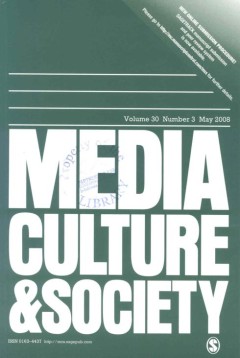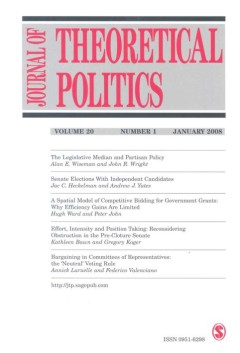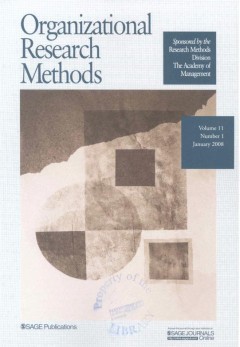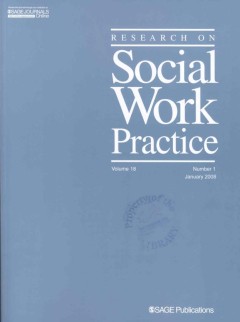Filter by

Persuasion through insult: the `f' word in Israeli media
This article is concerned with the rampant use of a particular cultural frame - freier (roughly "sucker") - in Israeli media. In this culture, the term is an unmitigated personal insult, and indeed has come to represent a threat to national identity. Nonetheless, it is widely used as a persuasive tactic in commercial, social and political rhetoric. The analysis of several hundred persuasive mes…
- Edition
- Vol. 30, No. 2, Page 239-256
- ISBN/ISSN
- 0163-4437
- Collation
- -
- Series Title
- Media, Culture & Society
- Call Number
- -

DAB: the future of radio? The development of digital radio in four European c…
In common with most media and consumer technologies, radio is migrating from analogue to digital operation. Europe was the first region of the world to develop a digital replacement for traditional analogue broadcast radio. The Digital Audio Broadcasting (DAB) project began in 1987 and the first domestic DAB broadcasts began in 1995. However, DAB has made less progress than originally anticipat…
- Edition
- Vol. 30, No. 2, Page 151-166
- ISBN/ISSN
- 0163-4437
- Collation
- -
- Series Title
- Media, Culture & Society
- Call Number
- -

Global citizenship as show business: the cultural politics of Make Poverty Hi…
What does global citizenship mean to citizens of a liberal democratic capitalist state? As part of an historically unprecedented, globally coordinated, NGO-led campaign against poverty in the underdeveloped south, "Make Poverty History" attempted to give this question an answer. Cultural politics was integral to the campaign. Make Poverty History was not only mediated (as all campaign must ber)…
- Edition
- Vol. 30, No. 2, Page 167-181
- ISBN/ISSN
- 0163-4437
- Collation
- -
- Series Title
- Media, Culture & Society
- Call Number
- -

"It kind of gives you that vintage feel": vinyl records and the trope of death
Vinyl records continue to be coveted and collected by loyal fans, despite the success of new technologies such as compact discs and MP#s. This article evaluates the evolution of records' cultural meanings, explaining the value these artifacts hold record collectors. Using archival analysis and in-depth interviews to analyse both historical and contemporary discourses surrounding records, we fin…
- Edition
- Vol. 30, No. 2, Page 183-195
- ISBN/ISSN
- 0163-4437
- Collation
- -
- Series Title
- Media, Culture & Society
- Call Number
- -

Character, audience agency and transmedia drama
Changes in the television industry with regards to the development of new media technologies are having a significant impact on audiences' engagement with television drama. This article explore how games can be used to extend audience engagement with audio-visual fiction onto a range of technological platforms to the point where "television" drama should increasingly be considered as "transmedi…
- Edition
- Vol. 30, No. 2, Page 197-213
- ISBN/ISSN
- 0163-4437
- Collation
- -
- Series Title
- Media, Culture & Society
- Call Number
- -

Electoral Poaching and Party Identification
This article studies electoral competition in a model of redistributive politics with deterministic voting and heterogeneous voter loyalties to political parties. We construct a natural measure of `party strength' based on the sizes and intensities of a party's loyal voter segments and demonstrate how party behavior varies with the two parties' strengths. In equilibrium, parties target or `poac…
- Edition
- Vol. 20, No. 3, Page 275-302
- ISBN/ISSN
- 0951-6298
- Collation
- -
- Series Title
- Journal of Theoretical Politics
- Call Number
- -

Applying the Methodology of Mechanism Design To the Choice of Electoral Systems
In this article we inquire into the strategic intent behind the design of election laws. Presuming that institutional designers are strategic and rational, we identify the extent of information incompleteness as determining their objectives for rule choice. For different levels of information incompleteness, we assess empirically the validity of explaining actual choices with designers' elector…
- Edition
- Vol. 20, No. 3, Page 303-327
- ISBN/ISSN
- 0951-6298
- Collation
- -
- Series Title
- Journal of Theoretical Politics
- Call Number
- -

Bribery and Favoritism in Queuing Models of Rationed Resource Allocation
Queuing mechanisms are commonly used in developing countries and in transition economies to allocate goods characterized by excess demand to citizens. Bribery and favoritism frequently accompany the use of such queuing mechanisms. Therefore, we first analyze a queuing model of resource allocation with bribery. Specifically, we determine the expected wait time of a citizen from the time he arriv…
- Edition
- Vol. 20, No. 3, Page 329-338
- ISBN/ISSN
- 0951-6298
- Collation
- -
- Series Title
- Journal of Theoretical Politics
- Call Number
- -

Foundations of Legislative Organization and Committee Influence
We revisit seemingly settled questions of legislative organization, specifying a more general, realistic, informational model than previously. While theorists, unlike empiricists, have commonly inferred that the floor lacks incentive to allow committee influence via gatekeeping, we find otherwise. By assuming that (1) legislators know more about the status quo than alternative proposals, …
- Edition
- Vol. 20, No. 3, Page 339-374
- ISBN/ISSN
- 0951-6298
- Collation
- -
- Series Title
- Journal of Theoretical Politics
- Call Number
- -

Working With Pluralism: Determining Quality in Qualitative Research
This Feature Topic contains four articles that address the determination of quality in qualitative research by exploring the use of criteria from the perspective of reviewers, editors, and/ or authors. In this introductory article, the authors assert that these explorations represent an important move away from employing listings of static criteria to adjudicate and develop qualitative research…
- Edition
- Vol. 11, No. 3, Page 419-429
- ISBN/ISSN
- 1094-4281
- Collation
- -
- Series Title
- Organizational Research Methods
- Call Number
- -

The Philosophy and Politics of Quality in Qualitative Organizational Research
Within this article, the authors outline the political and institutional structures that work to formulate operating norms that govern what is considered to be ``acceptable'' qualitative organizational research, and the quality indicators attached to foundational, quasi-foundational, and nonfoundational research orientations. They argue that encouraging a plurality of methods and representation…
- Edition
- Vol. 11, No. 3, Page 456-480
- ISBN/ISSN
- 1094-4281
- Collation
- -
- Series Title
- Organizational Research Methods
- Call Number
- -

Fitting Oval Pegs Into Round Holes: Tensions in Evaluating and Publishing Qua…
A study of qualitative researchers who have submitted and/or published their research in top-tier North American organizational and management journals reveals the evaluative criteria-in-use at these journals. Specifically, when asked to take the perspective of an (a) author, (b) evaluator (reviewer or editor), and (c) judge of the comparisons between qualitative and quantitative research, thre…
- Edition
- Vol. 11, No. 3, Page 481-509
- ISBN/ISSN
- 1094-4281
- Collation
- -
- Series Title
- Organizational Research Methods
- Call Number
- -

From liberalization to fragmentation: a sociology of French radio audiences s…
The last 30 years have seen a fragmentation of the radio station landscape in France. Since the 1980s, the liberalization of the French radio landscape has resulted in a strong trend towards the private youth music model of radio. But the process is neither a strict fragmentation by radio station or cluster of stations, nor a sharing out of listeners across all the nations. Such a structuring d…
- Edition
- Vol. 30, No. 2, Page 215-238
- ISBN/ISSN
- 0163-4437
- Collation
- -
- Series Title
- Media, Culture & Society
- Call Number
- -

Evaluating the Use of Reflective Counseling Group Supervision for Military Co…
The purpose of this study is to examine the effects of reflective counseling group supervision (RCGS) for military counselors. A convenience sampling method is adopted. Twenty-two military counselors participate in this study. Both qualitative and quantitative research methods are used for collecting and analyzing data. The results support our hypothesis that participants who received the RCGS …
- Edition
- Vol. 18, No. 4, Page 346-355
- ISBN/ISSN
- 1049-7315
- Collation
- -
- Series Title
- Research on Social Work Practice
- Call Number
- -

The Quest for Evidence-Based Practice?: We Are All Positivists!
Throughout the history of professional social work in the United States, the field has embraced a positivistic view of science, a view continuing to be held by the mainstream of the profession. All social workers, to some extent, embrace the fundamental tenets of positivism. However, the rhetoric espousing positivistic science has not been matched by corresponding actions on the part of our pro…
- Edition
- Vol. 18, No. 4, Page 339-345
- ISBN/ISSN
- 1049-7315
- Collation
- -
- Series Title
- Research on Social Work Practice
- Call Number
- -

Implementing Evidence-Based Social Work Practice
Recently, social work has been influenced by new forms of practice that hold promise for bringing practice and research together to strengthen the scientific knowledge base supporting social work intervention. The most recent new practice framework is evidence-based practice. However, although evidence-based practice has many qualities that might attract social workers to adopt it, use in pract…
- Edition
- Vol. 18, No. 4, Page 325-338
- ISBN/ISSN
- 1049-7315
- Collation
- -
- Series Title
- Research on Social Work Practice
- Call Number
- -

Developing Evidence-Based Child Protection Practice: A View From Germany
The child welfare system in Germany has been described as family service-oriented because families in need are entitled to request family support services. If there is any form of child maltreatment, there may be some kind of mandatory state intervention to protect the child. Using trends in the number of children affected by maltreatment, the rate of maltreated children noted by the child prot…
- Edition
- Vol. 18, No. 4, Page 319-324
- ISBN/ISSN
- 1049-7315
- Collation
- -
- Series Title
- Research on Social Work Practice
- Call Number
- -

Applying Randomized Controlled Trials and Systematic Reviews in Social Work R…
This article elaborates on the centrality of interventions for social work practice and the importance of understanding the effects of interventions for a more efficient, harmless, transparent, and ethical social work practice. Low-bias research designs and meta-analyses are important means of generating the best possible evidence on what works in social work practice. An evidence-based practic…
- Edition
- Vol. 18, No. 4, Page 311-318
- ISBN/ISSN
- 1049-7315
- Collation
- -
- Series Title
- Research on Social Work Practice
- Call Number
- -

Practitioner Expertise in Evidence-Based Practice Decision Making
Evidence-based practice (EBP) is an orientation to practice that values evidence as a resource for clinical decision making while recognizing that evidence alone is never sufficient to make a clinical decision. Critics of EBP typically ignore, negate, or misrepresent the role of practitioner thinking processes and expertise in clinical settings. The authors believe that, far from being a mechan…
- Edition
- Vol. 18, No. 4, Page 301-310
- ISBN/ISSN
- 1049-7315
- Collation
- -
- Series Title
- Research on Social Work Practice
- Call Number
- -

New Proposals for Generating and Exploiting Solution-Oriented Knowledge
The claim that professional social work should be based on scientific knowledge is many decades old with knowledge transfer usually moving in the direction from science to practice. The authors critique this model of knowledge transfer and support a hybrid one that places more of an emphasis on professional knowledge and action occurring in the real world. The authors particularly focus on the …
- Edition
- Vol. 18, No. 4, Page 292-300
- ISBN/ISSN
- 1049-7315
- Collation
- -
- Series Title
- Research on Social Work Practice
- Call Number
- -
 Computer Science, Information & General Works
Computer Science, Information & General Works  Philosophy & Psychology
Philosophy & Psychology  Religion
Religion  Social Sciences
Social Sciences  Language
Language  Pure Science
Pure Science  Applied Sciences
Applied Sciences  Art & Recreation
Art & Recreation  Literature
Literature  History & Geography
History & Geography